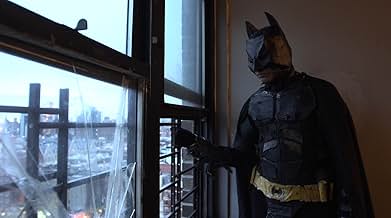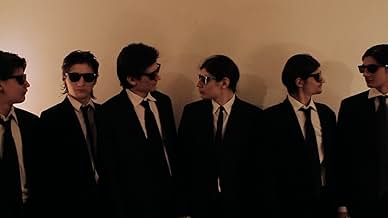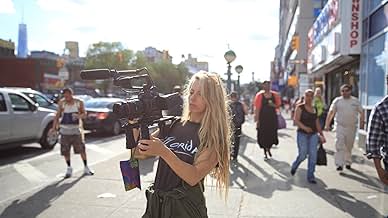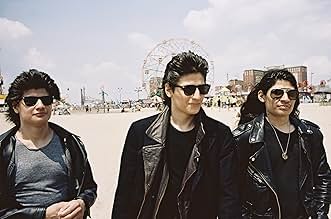AVALIAÇÃO DA IMDb
7,0/10
14 mil
SUA AVALIAÇÃO
Confinados a um apartamento num projecto de habitação em Nova Iorque, os seis irmãos Angulo aprenderam tudo o que sabem sobre o mundo vendo filmes e passando o seu tempo a recriar os seus fi... Ler tudoConfinados a um apartamento num projecto de habitação em Nova Iorque, os seis irmãos Angulo aprenderam tudo o que sabem sobre o mundo vendo filmes e passando o seu tempo a recriar os seus filmes favoritos em intrincados trajes caseiros.Confinados a um apartamento num projecto de habitação em Nova Iorque, os seis irmãos Angulo aprenderam tudo o que sabem sobre o mundo vendo filmes e passando o seu tempo a recriar os seus filmes favoritos em intrincados trajes caseiros.
- Prêmios
- 7 vitórias e 15 indicações no total
Christian Bale
- Self
- (cenas de arquivo)
- (não creditado)
Amanda Plummer
- Self
- (cenas de arquivo)
- (não creditado)
Isabella Rossellini
- Self
- (cenas de arquivo)
- (não creditado)
Avaliações em destaque
'The Wolfpack' doesn't come together
'The Wolfpack' is a film like no other. Sometimes that works well as it did in 'Inception', 'Pan's Labyrinth' and 'Blue Velvet.' At other times, it fails horribly, like it did in one of David Lynch's latest films (I stopped keeping up after a couple terrible films), 'Inland Empire.' 'The Wolfpack' is not completely terrible. It is interesting and takes on a unique subject. However, the film lacks focus and doesn't address the issues it highlights in any concrete manner.
I have the sense the director, Crystal Moselle, just ran into the family somewhere and decided to film them on a lark. Then after a couple of years, she decided to make a movie of it because graduation time in film school required her to present a film and the footage of nine people holed up in a Lower East Side tenement apartment was the only material she had available. Point is, there was no forethought in what the director/creator was doing, and it shows in the film.
Don't get me wrong. The film is interesting, and it's completely pointless. It's not quite surreal enough to stand on its own; it's far too repetitive for that. A dramatic moment in the film is when five of the brothers finally step out of the apartment together and see a film in a theater. That's it. While it might be dramatic for the brothers, the film doesn't convey that. The brothers also wonder aimlessly around Coney Island, and yes, the whole family takes an outing to a farm.
As a teacher I once had was fond of asking when I presented a paper, "So what?" So what indeed. With a subject this compelling, it's a shame there was only documentation of random repetitiveness. That isn't enough.
Rating: Rent it. It's been a long time since I intensely desired that a film end. It wasn't because I was uncomfortable with the subject, it was the feeling that I was ultimately just watching paint dry that made me want to leave. It's hard to believe that the film is only 80 minutes long.
Although the feelings of claustrophobia in the film's apartment work well on a large screen, there is not enough in the film to make it worth seeing in the theater. However, it wouldn't be a bad rental or better yet, a good sociological treatise. A cursory view of articles about the film tell us far more about the family than the film does, and that's a shame.
Peace, Tex Shelters
'The Wolfpack' is a film like no other. Sometimes that works well as it did in 'Inception', 'Pan's Labyrinth' and 'Blue Velvet.' At other times, it fails horribly, like it did in one of David Lynch's latest films (I stopped keeping up after a couple terrible films), 'Inland Empire.' 'The Wolfpack' is not completely terrible. It is interesting and takes on a unique subject. However, the film lacks focus and doesn't address the issues it highlights in any concrete manner.
I have the sense the director, Crystal Moselle, just ran into the family somewhere and decided to film them on a lark. Then after a couple of years, she decided to make a movie of it because graduation time in film school required her to present a film and the footage of nine people holed up in a Lower East Side tenement apartment was the only material she had available. Point is, there was no forethought in what the director/creator was doing, and it shows in the film.
Don't get me wrong. The film is interesting, and it's completely pointless. It's not quite surreal enough to stand on its own; it's far too repetitive for that. A dramatic moment in the film is when five of the brothers finally step out of the apartment together and see a film in a theater. That's it. While it might be dramatic for the brothers, the film doesn't convey that. The brothers also wonder aimlessly around Coney Island, and yes, the whole family takes an outing to a farm.
As a teacher I once had was fond of asking when I presented a paper, "So what?" So what indeed. With a subject this compelling, it's a shame there was only documentation of random repetitiveness. That isn't enough.
Rating: Rent it. It's been a long time since I intensely desired that a film end. It wasn't because I was uncomfortable with the subject, it was the feeling that I was ultimately just watching paint dry that made me want to leave. It's hard to believe that the film is only 80 minutes long.
Although the feelings of claustrophobia in the film's apartment work well on a large screen, there is not enough in the film to make it worth seeing in the theater. However, it wouldn't be a bad rental or better yet, a good sociological treatise. A cursory view of articles about the film tell us far more about the family than the film does, and that's a shame.
Peace, Tex Shelters
The Angulo family live in an apartment in New York's Lower East Side. Including the mother and father, there are nine of them. The boys spend considerable time re-enacting the contents of their favourite movies using home-made props and make-up. They are obsessed with movies in actual fact. But this can possibly be explained on account of the fact that these boys have more or less remained indoors their whole lives. Their domineering father being the primary reason this decision has been enforced, although the mother seems quite happy with the idea also. The boys seem okay with this situation, which from the outside seems incredibly unnatural and absurd. The boys existence makes me think of the life of a house cat; a type of feline that has been brought up and conditioned to stay indoors, such that it knows no different way of living, despite the fact that such an existence goes completely against the natural way of this type of animal. When its human beings submitting to this sort of thing though, it starts to seem more than a little bit strange.
The Wolfpack certainly has an unusual story to tell. For this reason I was somewhat disappointed with the film. While there is considerable interview material, for some reason there isn't all that much insight and I came away still being none the wiser about how this situation arose and was maintained for so many years. It's about people cut off from society through choice, yet you have to wonder how the social services could have allowed it. Children will go along with things because they know no different, unaware of what damage may be being done. I can't help think that these boys have been deprived of a considerable amount that they may come to fully realise in later life and their mother and father consequently seem unfit parents. The father in particular did not come out of this very well, his position was he was protesting against the system by choosing to not work and instead laze around at home drinking alcohol and watching TV. I wasn't very convinced by this stance. The boys seem surprisingly balanced considering their restrictive upbringing but I never even got a sense of what they felt when they finally emerged outside. So while the source material here is certainly of some interest, I can't say I thought too much of the execution and I left somewhat underwhelmed.
The Wolfpack certainly has an unusual story to tell. For this reason I was somewhat disappointed with the film. While there is considerable interview material, for some reason there isn't all that much insight and I came away still being none the wiser about how this situation arose and was maintained for so many years. It's about people cut off from society through choice, yet you have to wonder how the social services could have allowed it. Children will go along with things because they know no different, unaware of what damage may be being done. I can't help think that these boys have been deprived of a considerable amount that they may come to fully realise in later life and their mother and father consequently seem unfit parents. The father in particular did not come out of this very well, his position was he was protesting against the system by choosing to not work and instead laze around at home drinking alcohol and watching TV. I wasn't very convinced by this stance. The boys seem surprisingly balanced considering their restrictive upbringing but I never even got a sense of what they felt when they finally emerged outside. So while the source material here is certainly of some interest, I can't say I thought too much of the execution and I left somewhat underwhelmed.
The six Angulo boys, their sister and their mother live in a low-income New York City apartment with their father, Oscar Angulo, who won't let them go outside. Well, some years they get to leave their apartment and some years they don't. They are home schooled, which in the case of these kids, means watching movies all day, transcribing the scripts and then filming their own versions. These feral, Peruvian John Travolta looking teenagers have probably seen Pulp Fiction fifty times, though they most certainly prefer Reservoir Dogs. Normality, to them, is film. The world they find in film is inspiring, and, coupled with the natural tendency of the captured to escape, they break out, running down the streets of Manhattan, only to be chased down by budding documentary filmmaker, Crystal Moselle. The film begins there. Although the documentary disregards some major questions around the reasons for entrapment and isolation, the boys are fascinating and their impact is lasting. This film inspires the big dreamers; those who are looking to break their shackles.
The Angulos are an unusual family on the Lower East Side of Manhattan. The mother had met the Peruvian father while visiting. He fears dark government conspiracies and locked his family inside their apartment. They rarely go out and didn't go outside during one year. There are six boys and one girl who has mental difficulties. Their mother homeschooled the kids. The boys are movie fans and start recreating the films in their apartment.
Every family is unusual in their own way. Some families are unusual in every way. The cinematic hook for these boys is obviously their film reenactments. Their effort is pretty good considering the conditions. The movie does skim over some aspects which is not necessarily the filmmaker's fault. The father is probably the most fascinating character but he gets only a few scenes. Those scenes are very compelling but I want more. The filmmakers need to follow the guy. They need to find out what he does outside of the family. What does the family do for money? There's a blonde girl who suddenly shows up at the end. Who is she? There are a few questions that need better answers. The most compelling scene happens off screen. It's the first walk that the oldest boy takes outside without permission. He recounts the walk but it's not the same. It's a fascinating family but the movie leaves a few things unanswered.
Every family is unusual in their own way. Some families are unusual in every way. The cinematic hook for these boys is obviously their film reenactments. Their effort is pretty good considering the conditions. The movie does skim over some aspects which is not necessarily the filmmaker's fault. The father is probably the most fascinating character but he gets only a few scenes. Those scenes are very compelling but I want more. The filmmakers need to follow the guy. They need to find out what he does outside of the family. What does the family do for money? There's a blonde girl who suddenly shows up at the end. Who is she? There are a few questions that need better answers. The most compelling scene happens off screen. It's the first walk that the oldest boy takes outside without permission. He recounts the walk but it's not the same. It's a fascinating family but the movie leaves a few things unanswered.
I thought this documentary was a mess. Sketches of information were given to us and left up to the viewer to fill in the blanks. First and foremost, what is going on with the parents? We know that the father is abusive toward the mother and has kept her virtually locked away from her family and society. Okay, we get that. But then it shows a scene of her out jogging. Hello! Would you care to elaborate on why this woman who has been abused for 20 years is out exercising? Why did she decide to call her mother after all these years? If she is going outdoors now, too then does she plan on leaving him? Does she realize how sick her husband is? Well, we don't know what she thinks because it appears the film maker never asked her.
The father, who is the central character here, is shown as a lazy drunk who either is paranoid or uses his distrust of society as a reason to sit at home all day and drink. Why doesn't the filmmaker get him to talk so we can figure out if he's a leach or mentally ill? Does he abuse his kids, too? If he kept his kids inside all those years, he doesn't seem too upset that they're going out. And wait.....is that him and his wife walking hand and hand through a park together? If you find the 20/20 story somewhere then I recommend watching that instead of this. You'll come away with twice the understanding in half the time.
The father, who is the central character here, is shown as a lazy drunk who either is paranoid or uses his distrust of society as a reason to sit at home all day and drink. Why doesn't the filmmaker get him to talk so we can figure out if he's a leach or mentally ill? Does he abuse his kids, too? If he kept his kids inside all those years, he doesn't seem too upset that they're going out. And wait.....is that him and his wife walking hand and hand through a park together? If you find the 20/20 story somewhere then I recommend watching that instead of this. You'll come away with twice the understanding in half the time.
Você sabia?
- CuriosidadesThis film was partially supported by the Adrienne Shelly Foundation, a nonprofit organization that awards grants to female actors, writers, and/or directors of short films, feature films, and documentaries. The foundation was created by Andy Ostroy, the widower of actress, writer, and director Adrienne Shelly, after Shelly was murdered in 2006 at the age of 40.
- Cenas durante ou pós-créditosAfter the ending credits have rolled, a wolf howls
- Trilhas sonorasThis Is Halloween
Written by Danny Elfman
Performed by The Citizens of Halloween Town
Published by Buena Vista Music Company
Courtesy of Walt Disney Records
Principais escolhas
Faça login para avaliar e ver a lista de recomendações personalizadas
- How long is The Wolfpack?Fornecido pela Alexa
Detalhes
- Data de lançamento
- País de origem
- Idioma
- Também conhecido como
- Wolfpack: lobos de Manhattan
- Locações de filme
- Empresas de produção
- Consulte mais créditos da empresa na IMDbPro
Bilheteria
- Faturamento bruto nos EUA e Canadá
- US$ 1.301.696
- Fim de semana de estreia nos EUA e Canadá
- US$ 43.920
- 14 de jun. de 2015
- Faturamento bruto mundial
- US$ 1.414.140
Contribua para esta página
Sugerir uma alteração ou adicionar conteúdo ausente






























